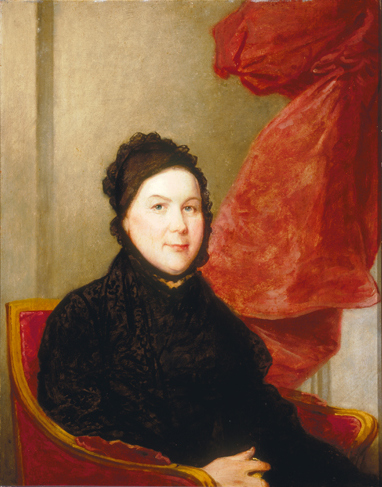 |
| Maj. Gen. & Mrs. Greene, date unknown |
Caty lost her mother at the tender age of 10, and in order to give her proper feminine influence, her father sent her to live with her aunt and uncle. She met Nathanael when she was 17, married him at 19 (he was not quite 32), then less than a year later had to surrender her hopes for a happy domestic life to his involvement in the cause of independence.
She made the most of it, however, and traveled whenever she could to be with him in the field--even during the terrible winter at Valley Forge. Famous for her charm and wit, she became a favorite with George and Martha Washington, and her presence helped fuel the effort to maintain a semblance of social normalcy for the Continental officers. It's said that she was so much a favorite with George Washington that he claimed her as a dance partner for hours at a time, on more than one occasion.
Caty's vivacious nature, while making her the darling of wartime society, left her wide open to rumors of infidelity. Caty made light of the accusations, brushing them off with vague answers that left room for the flirtations that happened sometimes under Nathanael's very nose--and it was common and somewhat socially acceptable during that era for women and men to "carry on" in public, up to a certain point.
The rumors were never really substantiated, however. To all appearances, Caty remained devoted to her husband and insisted even on journeying to him all the way from Philadelphia to South Carolina early in 1782, after Greene had largely exhausted the strength of the British forces and the surrender at Yorktown had taken place. Four of their six children were born during the war, although Nathanael was not free to rejoin his family until sometime in 1783.
Even then, her hopes for a peaceful family life were disappointed. Greene had essentially fed and clothed the Continental Army out of his own pockets during the Southern Campaign and at the close of the war found himself in dire financial straits. As partial compensation, Congress awarded him the estate of Mulberry Grove near Savannah, Georgia, and both Nathanael and Caty set to learning how to run a Southern plantation.
In June of 1786, tragedy struck. Nathanael Greene fell ill from sunstroke after being out too long surveying a neighbor's fields, and died a few days later. Both Caty and their mutual friend Anthony Wayne, who was present during Nathanael's illness and death, were devastated, but Caty did not give up. She determined to make plantation successful
 |
| Catharine Greene Miller in 1809 |
In 1796, she married Phineas Miller, with the Washingtons in attendance. Mulberry Grove fell upon hard times and had to be sold, and Caty and Phineas moved to another holding originally given to Nathanael, an estate called Dungeness on Cumberland Island, Georgia. Phineas died in 1803; and in 1814, Caty followed.
The ironies of history amaze me. This couple from middle-class beginnings in Rhode Island had such an impact on our country's future and on the South in particular. If Nathanael had not died unexpectedly of sunstroke and left Caty to carve out her own future, would she have encouraged Eli Whitney in his progress on the cotton gin? If Caty had not first fueled and supported Nathanael's passion to win this country's independence, would he have had such heart for the long agony of the American Revolution in general, and the Southern Campaign in particular? We may never know, but the brief glimpses of their lives have provided an endless source of fascination for me.

Fascinating! Isn't it amazing how God puts people in different situations to fulfill His will? What a challenging life Caty had, though.
ReplyDeleteIt is amazing! I'd love to write a novel about the Greenes ... but oh the research!!
ReplyDeleteInteresting post Shannon. I had not heard of Caty before reading this.
ReplyDeleteBlessings, Tina
Truly? :) I'm so glad to have introduced you to her, then! Blessings!
DeleteThank you for sharing this interesting post. Caty was quite a lady!
ReplyDeleteYou're welcome! I've found her quite remarkable. :) Thank you for stopping by!
DeleteI love these stories that the CQ ladies find and share. Fascinating!
ReplyDeleteThanks, Debra! :)
DeleteInteresting information! Thank you for sharing.
ReplyDeleteYou're welcome, and thanks so much for taking the time to comment! :)
DeleteThanks for such an interesting post on some of the backstory of Caty Greene. I suspect there are many fascinating tales about the wives of our American patriots.
ReplyDeleteGlad you enjoyed it, Janet!
Delete